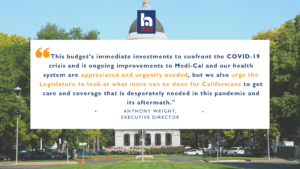
Last week, Governor Gavin Newsom unveiled the January proposal for the 2021-22 State Budget. The budget provides needed short-term investments to help Californians in crisis, but more ongoing and long-term support will be necessary to move California down the road towards health and economic recovery.
We still urge the CA state legislature to look at what more can be done for Californians to get care and coverage that is desperately needed in this pandemic and its aftermath.
The success of our health and economic recovery depends not just on these upfront investments, but our ongoing commitments to care, coverage and public health. This proposed budget includes a range of specific investments in response to the COVID-19 crisis, including $372 million to augment the over $400 million already allocated for vaccine distribution. This critical investment is a key step in controlling the COVID-19 pandemic since shortening this pandemic by even a few weeks would save thousands of lives, and help restart our economic recovery sooner.
The Governor’s proposed budget makes other key health investments, including a $532 million state commitment to restarting the Cal-AIM effort to improve Medi-Cal program. The budget delays suspensions and cuts from last year, such as a $1.2 billion cut to Medi-Cal, which was taken from Prop 56 tobacco tax funds that have gone as supplemental payments to Medi-Cal providers over the past several years. That cut is delayed for one year, as are other sunsets and suspensions for Medi-Cal coverage of extended post-partum coverage, and benefits like audiology, optical services, podiatry and others. The budget would also add glucose monitoring as a Medi-Cal benefit.
#Health4All
While some Medi-Cal investments were made, other key expansions were not included, such as a the critical step of removing barriers to Medi-Cal based on immigration status. This is of particular need for elders in the middle of a pandemic that is disproportionately harming seniors and communities of color.
In order to fully address this pandemic and its aftermath, California leaders must recommit to expanding coverage and affordability assistance. We need to provide more assistance for those who have lost coverage along with their jobs and income, increase affordability assistance in Covered California, and remove exclusions in Medi-Cal based on immigration status.
The coronavirus does not discriminate based on immigration status, and our health care system shouldn’t either.
We are stronger when everyone is included getting the treatment and care they need as soon as possible, especially our seniors who are at most at-risk in this current pandemic.
We will continue to fight to cover the Californians explicitly excluded from coverage because of where they were born, toward the goal of a more universal, accessible health system for all.
We ask our state leaders to think bigger and bolder about how to increase revenues for our state, including ideas to increase taxes on the richest California’s who have only grown their wealth during this pandemic.
Ultimately, we need major investments in health care and coverage to get out of this crisis, particularly for low-income and communities of color being especially hard hit by the dual health and economic consequences of COVID-19.